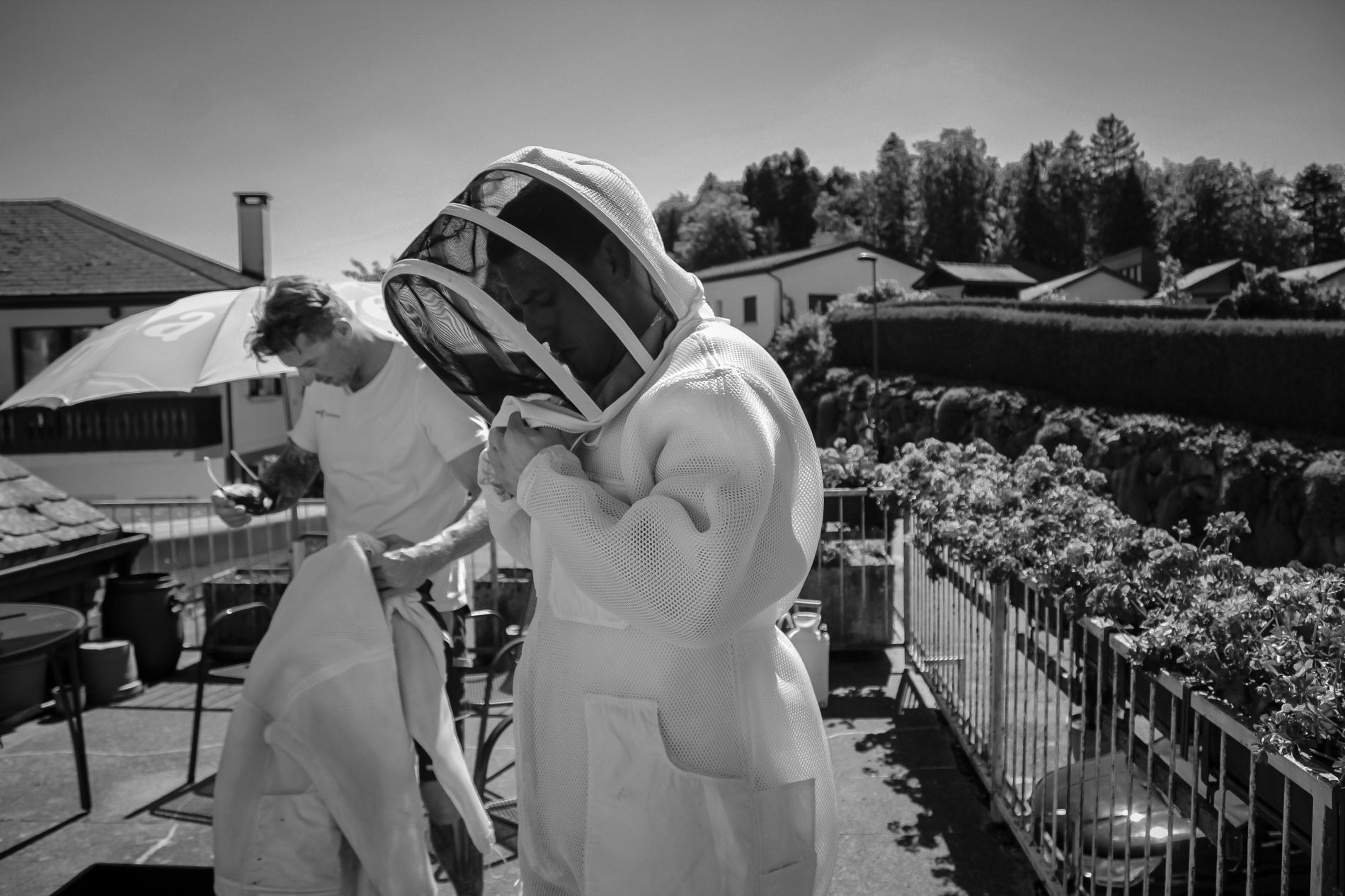
Fighting Asian hornets in Büttenhardt
Have you discovered an Asian hornet's nest? We'll be on site quickly! Call now - Daily Mon-Sun 07:00-21:30. Contact us now: 058 510 22 54
Having the Asian hornet's nest removed
The hornet species Vespa velutina, originating from South-East Asia, has spread invasively to Switzerland and the entire subcontinent. While it does not exhibit hostility towards humans, it has developed a reputation as an avid predator of honey bees, creating worry among beekeepers. Just a few of these hornets have the capacity to swiftly attack and wipe out a colony of bees within a short period of time. If you have discovered a hornet's nest on your house, patio, shed, or in your blind box, contact our experts for hornet nest removal in Büttenhardt!
Use the uncomplicated telephone service of the Hornet experts in Büttenhardt and simply inform us at 058 510 22 54, we will be on site quickly so that you and everyone in your area feel completely safe again.
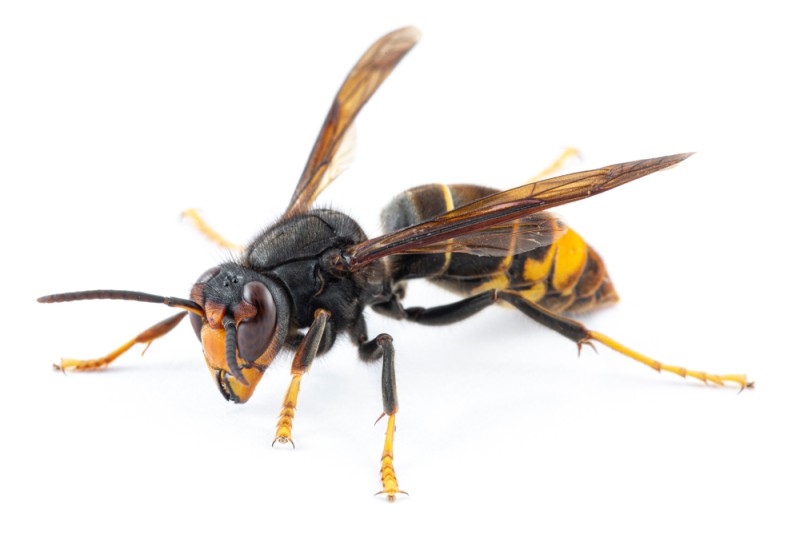

Appearance of the Asian hornet
Here are some characteristics that distinguish the Asian hornet:
1. Size: The queen can reach a length of about 3 cm, while the workers are slightly smaller and measure about 2.5 cm.
2. Color: The Asian hornet has a dark body that is almost black, with a yellow stripe at the back of the abdomen. Its face is orange-yellow.
3. Wings: The wings are dark and almost smoky gray.
4. Legs: The hornet has yellow tips on its legs, which is a striking distinguishing feature when it flies.
5. Nest: The Asian hornet's nest is often high in the trees, but it can also be found underground or in tall structures such as chimneys. It has an oval shape and is made of chewed wood, which gives the hornet a papery texture.
It is important to distinguish the Asian hornet from the European hornet (Vespa crabro), which is more harmless and a natural part of the European fauna. If you suspect you have found an Asian hornet nest near you in Büttenhardt, you should report this to the local authorities, or using our reporting form, as they can spread quickly and be harmful to bees and other insects. To avoid being attacked by the flying inhabitants, you should hire a professional pest controller such as the Hornet Experts Büttenhardt. We can identify the nest beyond doubt and take further steps to remove the Asian hornets professionally.
News about the Asian hornet in Büttenhardt
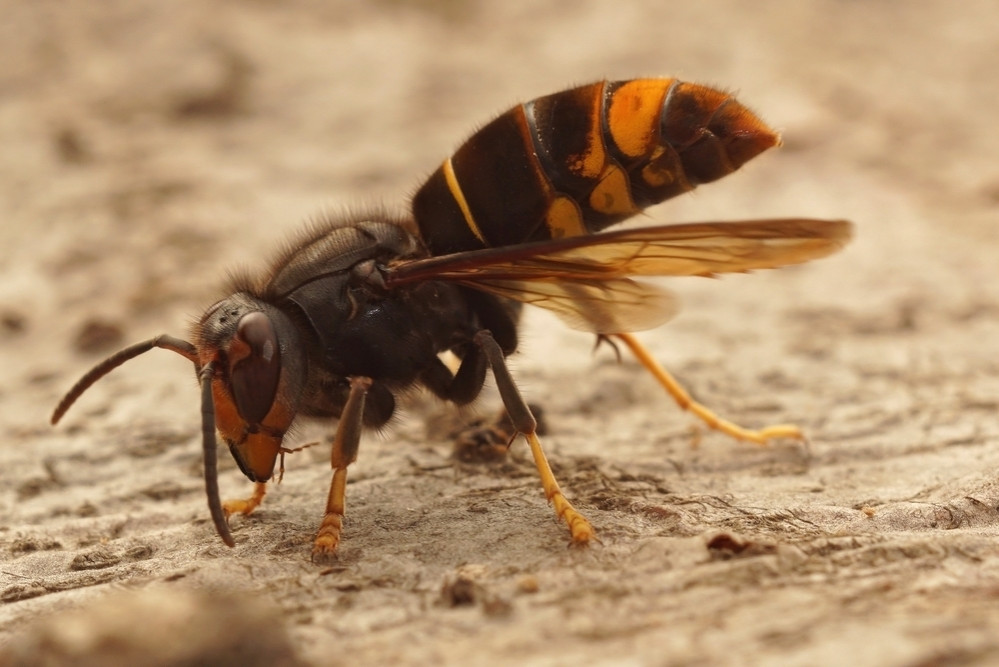
02.12.2025 Western Switzerland: Killer hornet eats bees
The territory of the Asian killer hornet has expanded considerably this year, with a notable increase reported in western Switzerland. This invasive species poses a significant threat to native bee populations, as bees make up the majority of its diet. The potential consequences are serious. Moreover, the hornet represents a danger to individuals with allergies to its venom.
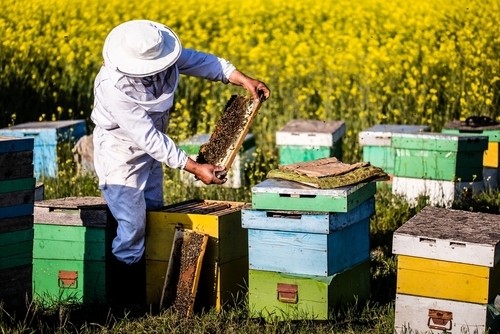
25.11.2025 Serious concerns about the bee population!
Asian hornets are inflicting significant harm on beehives across multiple parts of Europe, as reported by local beekeepers. Even a small number of hornets can destroy an entire bee colony within hours. This sharp decline in pollinators could have serious consequences for pollination, local ecosystems, and agricultural productivity.
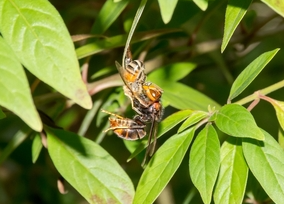
18.11.2025 Asian hornet doesn't just eat bees!
The danger it presents to insects is substantial!
The Asian hornet feeds largely on honeybees—up to 85 percent of its diet—alongside beetles and flies. This high level of predation not only poses difficulties for fruit growers but also further threatens already vulnerable bee populations.
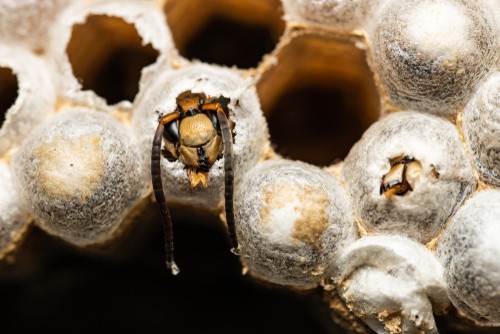
11.11.2025 How did the Asian hornet get to Europe?
The Asian hornet likely arrived in Europe unintentionally and has quickly expanded throughout France and nearby countries. Its adaptability to different environments and the absence of natural predators have contributed to its rapid spread. A single nest can generate several hundred new queens in one breeding season.
Asian Hornet Reporting Form
Please fill out all required fields and submit the form.
Help us!
If you discover an Asian hornet or a nest of this invasive species in Büttenhardt, it is of the utmost importance that you report it immediately. The Asian hornet is not only dangerous to humans, but also poses a serious threat to native bee populations and the ecological balance in Switzerland.
Why is it important to report the find?
When the Asian hornet becomes established in certain regions, it has a profound impact on native insects, especially honey bees. Their predatory behavior towards bees results in a decline in pollinator populations, which in turn affects the local flora and agricultural productivity. By reporting sightings, experts can react quickly, remove the hornets or their nests and thus prevent the spread of this invasive species.
Notification form for sightings
Our shared responsibility lies in regulating the overpopulation of Asian hornets in Switzerland and protecting our native insect populations. We urge you to promptly report any suspicions or sightings using our specialized reporting form. With your valuable contribution, we can take timely action and mitigate the spread of this dangerous species within our fragile ecosystems.
Your contribution is crucial in the fight against the Asian hornet in Büttenhardt. Together we can protect nature and maintain the balance of our ecosystems;
Thank you for your vigilant attention and your commitment to protecting our environment.
How dangerous is the Asian hornet?
The Asian hornet (Vespa velutina) is a predatory insect that originated in Asia and has spread in recent years to various parts of Europe, including France and now also Switzerland and in Büttenhardt. Although it poses a threat to honey bees and native biodiversity, it is generally no more dangerous to humans than other wasp species. Nevertheless, there are some aspects to be aware of:
1. Threat to honey bees: The Asian hornet preys on honey bees, threatening native bee populations. A decline in bees can have a negative impact on pollination and thus on local flora and agricultural production.
2. Stings: As with other wasp and hornet species, the stings of the Asian hornet can also be painful. For most people, the stings are unpleasant but not dangerous. However, people who are allergic to wasp or hornet stings can suffer a severe allergic reaction, which in the worst case can lead to anaphylactic shock.
3. Aggressiveness: Although the Asian hornet is not necessarily more aggressive towards humans than other wasp species, it can become aggressive if it feels threatened, especially near its nest.
4. Ecological effects: Apart from the direct effects on honey bees, the spread of the Asian hornet can also disturb the ecological balance by affecting the populations of other insects.
It is important to highlight the distinction between the Asian hornet and the Asian giant hornet (*Vespa mandarinia*). The giant hornet, also known as the "killer hornet," is significantly larger and potentially poses higher dangers to humans due to its more potent venom and larger sting.
If you have discovered a nest, call us immediately: 058 510 22 54
Our hornet professionals in Büttenhardt are certified by the VSS.
Frequently Asked Questions About Asian Hornets in Büttenhardt
Known for its ability to cause stings that are potentially severe or even lethal, the Asian hornet exhibits a higher level of danger compared to the majority of other hornet species.
The Asian hornet is an impressive stinging insect, growing up to 3 cm long. Its slender, obsidian body dons a dense, attention-grabbing ensemble of orange, yellow, and black stripes, creating a remarkable visual display.
The venom of the Asian hornet is highly toxic to humans, causing painful bites that can result in allergic reactions.
Humans should exercise extreme caution when encountering the Asian hornet, as its venom is highly toxic and poses a grave danger to them. A sting from this insect can induce significant pain and potentially trigger allergic responses.
The poisonous sting of the Asian hornet elevates its level of danger, as it surpasses that of other wasps in terms of both pain intensity and its potential to induce allergic reactions in humans.
To report the discovery of an Asian hornet, reach out to a regional wild bee protection officer or the relevant agency pertaining to the responsible Ministry of Agriculture to ensure that an accurate report is provided.
Encouraging the reporting of Asian hornets is vital to minimize the risk of attacks and curb the propagation of this invasive insect. The intense territoriality and aggression exhibited by these hornets necessitate prompt and diligent reporting.
Addressing the issue of Asian hornets in Switzerland necessitates professional hornet control. It is advisable to consider calling a pest control service to ensure effective management.
Regulatory protections do not extend to the Asian hornet species. However, it is essential to closely monitor their numbers to contain their potential for propagation.
The Asian hornet, during hibernation, can be found either hibernating in groups or as individuals, often occupying the corners of walls, buildings, garden sheds, chance houses, or tree hollows.
Would you like more information about Asian hornets? Then take a look at our FAQ's about Asian hornets.
Private inquiry form
For an uncomplicated request to remove an Asian hornet's nest, please use our contact form for private individuals.
Real estate inquiry form
Use our property management order form to request the removal of an Asian hornet's nest.




_26.jpeg)
_22.jpeg)
_21.jpeg)
_20.jpeg)